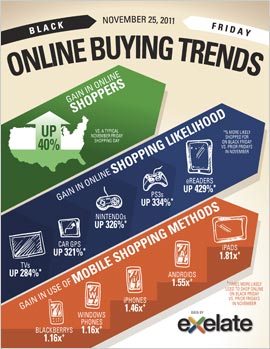Commentary
How The 'Turkey Effect' Influences Online Shopping
- by Laurie Sullivan , Staff Writer @lauriesullivan, December 5, 2011
 Marketers should prepare for a rerun
on Christmas Day similar to the data that eXelate CEO Mark Zagorski collected on Thanksgiving Day. He calls it "the turkey effect" -- the day overstuffed humans lounged on couches with mobile device
in hand, searching the Internet for holiday deals.
Marketers should prepare for a rerun
on Christmas Day similar to the data that eXelate CEO Mark Zagorski collected on Thanksgiving Day. He calls it "the turkey effect" -- the day overstuffed humans lounged on couches with mobile device
in hand, searching the Internet for holiday deals.
For the next three weeks, Zagorski and crew will monitor human search and buying behavior to see whether smartphones and tablets continue to change the way consumers shop. "You would expect the axis to rise across all devices if shopping rose, but for some reason they were more likely to use these devices on Thanksgiving Day and Black Friday," he said. "Shopping on mobile devices rose higher on these days than we expected."
Mobile devices and faster Internet speeds will make Cyber Monday obsolete. Most people will not pull themselves away from the television and football games to go the PC to shop, but now that they have a tablet or smartphone with a good browser to search the Internet, that will change. Zagorski predicts that by 2012, retailers will sell more products online on Black Friday compared with Cyber Monday. The trend will follow through to Christmas Day as well.
U.S. consumers spent more than $1 billion online for three days during the week of Cyber Monday, according to comScore. The increase of days and spending online clearly indicates changes in consumer behavior.
Although Mondays outperform Fridays when it comes to online shopping by about 14%, Cyber Monday online shopping outpaced sales on Black Friday by 17%, according to Zagorski. The numbers suggest the gap between the two days has begun to narrow, he said.
Free shipping also helped to spur online sales. Throughout the 2011 holiday season, more than half of all transactions included free shipping, with rates increasing later into the season. The week of Thanksgiving, ending Nov. 27, saw free shipping occur on 64.4% of transactions, while Cyber Week maintained a similar level at 63.2%, according to comScore. These rates were approximately 10 percentage points higher than last year.



